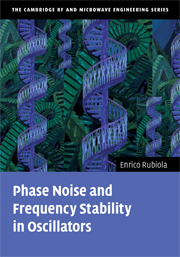Book contents
- Frontmatter
- Contents
- Foreword by Lute Maleki
- Foreword by David Leeson
- Preface
- Notation
- 1 Phase noise and frequency stability
- 2 Phase noise in semiconductors and amplifiers
- 3 Heuristic approach to the Leeson effect
- 4 Phase noise and feedback theory
- 5 Noise in delay-line oscillators and lasers
- 6 Oscillator hacking
- Appendix A Laplace transforms
- References
- Index
Foreword by David Leeson
Published online by Cambridge University Press: 24 January 2011
- Frontmatter
- Contents
- Foreword by Lute Maleki
- Foreword by David Leeson
- Preface
- Notation
- 1 Phase noise and frequency stability
- 2 Phase noise in semiconductors and amplifiers
- 3 Heuristic approach to the Leeson effect
- 4 Phase noise and feedback theory
- 5 Noise in delay-line oscillators and lasers
- 6 Oscillator hacking
- Appendix A Laplace transforms
- References
- Index
Summary
Permit me to place Enrico Rubiola's excellent book Phase Noise and Frequency Stability in Oscillators in context with the history of the subject over the past five decades, going back to the beginnings of my own professional interest in oscillator frequency stability.
Oscillator instabilities are a fundamental concern for systems tasked with keeping and distributing precision time or frequency. Also, oscillator phase noise limits the demodulated signal-to-noise ratio in communication systems that rely on phase modulation, such as microwave relay systems, including satellite and deep-space links. Comparably important are the dynamic range limits in multisignal systems resulting from the masking of small signals of interest by oscillator phase noise on adjacent large signals. For example, Doppler radar targets are masked by ground clutter noise.
These infrastructure systems have been well served by what might now be termed the classical theory and measurement of oscillator noise, of which this volume is a comprehensive and up-to-date tutorial. Rubiola also exposes a number of significant concepts that have escaped prior widespread notice.
My early interest in oscillator noise came as solid-state signal sources began to be applied to the radars that had been under development since the days of the MIT Radiation Laboratory. I was initiated into the phase-noise requirements of airborne Doppler radar and the underlying arts of crystal oscillators, power amplifiers, and nonlinear-reactance frequency multipliers.
- Type
- Chapter
- Information
- Phase Noise and Frequency Stability in Oscillators , pp. xii - xivPublisher: Cambridge University PressPrint publication year: 2008

